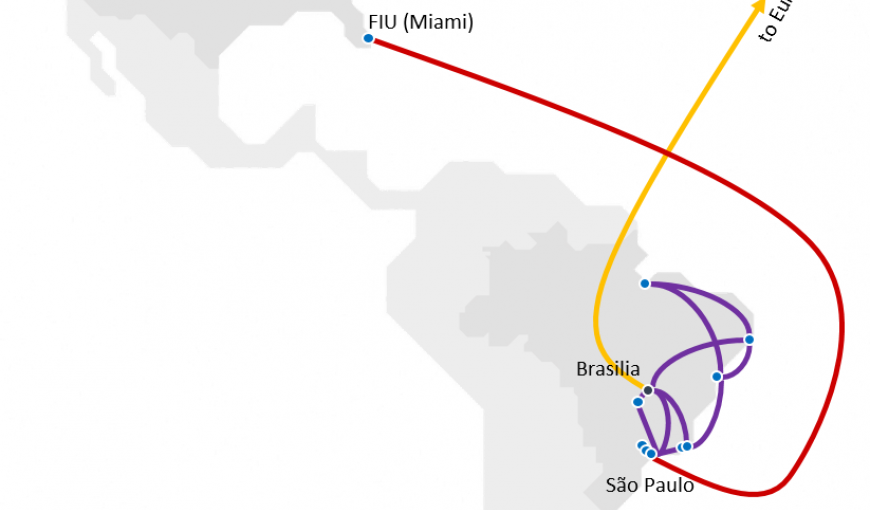Universities get a platform for research in Future Internet
Internet as we know it is 40 years old and is giving signs that it needs to reinvent itself. The exhaustion of IP addresses, the progress of the Internet of Things, cyber-attacks, real-time applications and mobile Internet are some of the challenges for the expansion of the current web. With over 3.3 users in 2015, Internet has grown, but the basic principles for its operation remain the same. The solutions found until this time and the inclusion of new functionalities, not set out in the original project, have turned the Internet into a true “patchwork”.
Due to that, the worldwide community of computer network is constantly seeking a Future Internet, which proposes new alternative architectures. The theories proposed either an evolution of the Internet, or a new model built from scratch. In any case, in order to carry out experiments, a part of the Internet’s infrastructure may be used as a testbed. “We built juxtaposed networks, isolated from the network in production, to try out new ideas in this environment”, the Advanced Internet adjunct-director of the Brazilian National Research and Educational Network (RNP), Iara Machado, explained.
RNP, which operates the Brazilian academic network, provides the Fibre platform (Future Internet Brazilian Environment for Experimentation) for experiments on Future Internet. This environment works as a large-scale virtual laboratory and is formed by a federation of 11 experimentation islands, housed in Brazilian universities and research institutions.
This infrastructure is open to any laboratory interested in Future Internet, especially to computing professors and students who wish to have access to a real experimentation environment. Fibre also works as a large-scale laboratory for use in practical computer network classes. “Preparing the next generation of researchers for the Internet of the Future challenge is valuable. We are working with the professors for them to use the tool with the students, in the teaching of computer network disciplines”, Iara Machado stated.
Fibre is the result of a project coordinated between Brazil and the European Union, since 2010, for Information and Communication Technologies (ICT). The initial goal was to develop an environment that allowed the collaboration between Brazilian and European researchers in Internet of the Future projects. The legacy is a platform that is remotely available to any university, institution or company in Brazil or in Latin America, interested in contributing to the evolution of the Internet.
Partnership
The Federal University of Minas Gerais (UFMG) cooperates with RNP for the evolution of the platform, adopting network virtualization techniques in order to achieve the flexibility required by this experimentation environment. By means of the software-defined networks (SDN), it is possible to better control and manage several network topologies. “We use Fibre to adopt SDN practices in a real physical environment. For example, a student in Goiânia can activate a SDN controller and command network equipment located in Brasília. You do not need to have the intelligence with the network, it is possible to configure it far from a physical testbed”, Heitor Motta, from UFMG’s Computer Sciences Department, explains.
Through yet another coordinated invitation launched by Brazil and the European Union in 2015, the Fibre platform shall be one of the experimentation infrastructures adopted by the Futebol (Federated Union of Telecommunications Research Facilities for an EU-Brazil Open Laboratory) project. Beginning in March, 2016, the work has the participation from the Trinity College, in Ireland, the University of Bristol, in the United Kingdom, and the Federal Universities of Rio Grande do Sul (UFRGS), Espírito Santo (Ufes), Minas Gerais (UFMG), Ceará (UFCE) and the State University of Campinas (Unicamp), in addition to companies Digitel and Intel Brasil. The goal is to build an experimental platform to explore the integration between optical and wireless networks.
For further information on how to take part in it, access www.fibre.org.br.
